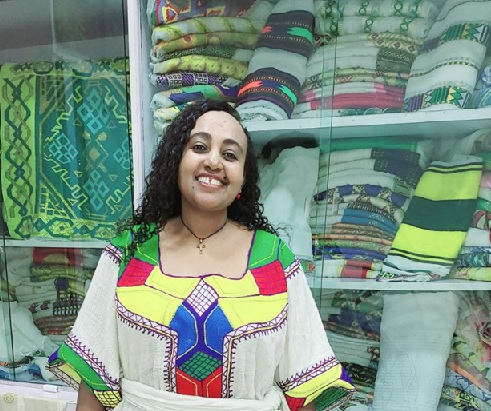
BY NAOL GIRMA
Though the origin of the celebration of Timket Ethiopian Epiphany is traceable to religious roots, many look forward to and pine for it due to its cultural lures, chief among which are the Sunday bests the laity and celebrants put on by way of dressing to kill.
Timket’s being an outdoor service, which is accompanied by warm traditional singings and dancings, adds luster to the vibe. S/he who afford to buy new cloths buy one, while others wash their best clothes to appear sumptuous as Epiphany is a symbol of cleansing and ablution from the soot of sin. Furthermore, it is a time for undoing umbrages.
Even if the celebration ripples across the nation in a peculiar way as per the respective towns and cultures, tagging the replicas of the Ark of the covenant pouring out to the streets with striking physical appearance and eye-catching hair braids are must-dos.
All from the age brackets especially members from the fair sex beautify themselves to stick out from the crowd. The saying also goes “let attires not meant for magnifying one’s attraction in Timket turn to tatters”.
Timket also creates an opportune moment for lads to find lasses—their left ribs. In a statement they gave to journalists, celebrants noted that the aforementioned saying about attires shows concern of celebration’s participants to stick out from the crowd.
Also, in the countryside Tir (January) is a harvesting season. It is a time when farmers enjoy financial returns after toiling long on their farming plots. They will also have leisure time in their hands for merrymaking such as weddings. Farmers get a reason to purchase clothes to themselves and their children. It is a time for buying clothes to the betrothed.
Timket is a time when girls and children are off the leash. They are at liberty to go out to partake in the outdoor event. Mothers also want to see their children well attired. As it is also a time the chilling cold season gives way to a relatively warm season, Timket is an occasion for putting light and colorful dresses and entertaining a feeling of euphoria.
That is why costume shops are thronged by customers when Epiphany draws close. The adage about attires is felt reflected in attires transactions. The event creates a source of income to us, says those engaged in costumes selling. Almost all the faithful buy costumes as per their income scale, for sellers on the sector get prepared for such transaction ahead of time. Many are those window-shopping at a loss which attire to buy. They get in, tarry a bit and get out with a bundle of clothes or empty handed. Not a few are also those who take appointment and settle a down payment for the right size to be prepared for them as fast before the event.
As many were the customers it did take this reporter long to get the consent of a seller for interview. Timket is the right occasion for the sale of traditional clothes that sale like a hot cake. As the day draws nigh the transaction soars up.
Balancing things selling and buying products at affordable price traders and clients aspire to mark the occasion in a colorful an unforgettable manner. What a wonderful clicking of the two at a moment of warding off grudges. Happiness is seen stamped on both faces on the opposite end of the transaction. There is no room for complaint. Not close fisted, celebrants outlay their long-saved money for such a special occasion.
The norm of appearing with new or clean attires and sunny faces is one we inherited norm from our forefathers. To keep the trend and pass it down to the coming generation, an influx of women, with their parents, are seen at costume shops at times with their children.
As Timket is somewhat like a fashion show many hunt for the right attire. Though inflation is heavily weighing on clients they never fail to pick one they could afford to buy, for many are who salt away money for this special festival.
The adage about the attire throws light on the fact that Timket is a special day of cleanliness. Celebrated therefore it must be in a striking manner.
Mostly, the costumes are made of cotton in a unique Ethiopian style. The wondrous religious ceremony entwined with traditional one is listed in UNESCO’s heritage list.
Approached by this reporter, an Ethiopian traditional clothes sealer around Arat Killo, Amsale Baye explained that traditional Ethiopian clothing is a mark of the country’s distinct heritages and identity. Ethiopians take pride in their traditional clothes. On Timket day, people are seen wearing splendid cultural dressings and adoring themselves with various traditional clothes and cosmetics .As to her, most of her potential customers are taking semi-processed and finished products
“Particularly this year as the country has regained its tranquility, especially in the northern part of the country, Timket festival is colorfully being marked and our business is gaining momentum.”
The Ethiopian Herald January 19/2023




